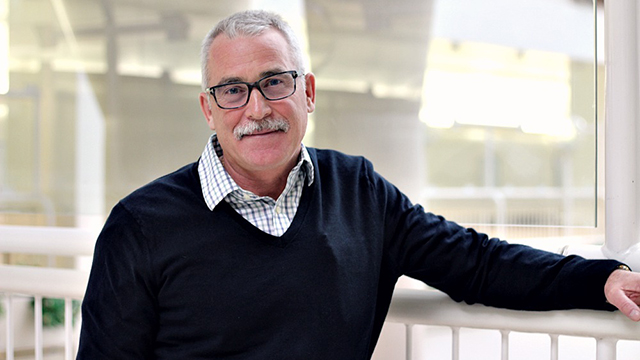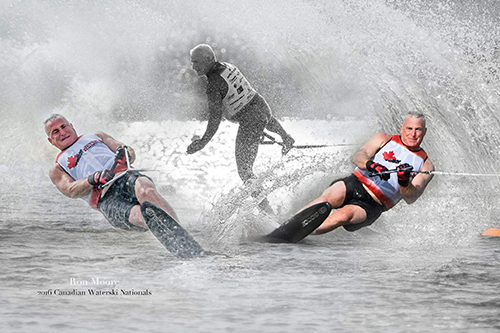
Ron Moore with his Movember mustache
Although Ron Moore is a surgeon-scientist specializing in urological cancers such as prostate cancer, as November and the Movember movement comes to a close, he thinks it's important that people recognize men's health issues expand beyond prostate cancer.
"Men tend to be quiet about their problems, the focus of Movember this time around has been mental health, which is really a problem," says Moore.
Men in the 40 to 55 age group are at a high-risk for suicide with Moore pointing to many contributing factors at this time of life such as changes in relationships and stressors with jobs that have an impact, as well as worrying about children leaving the home and ageing parents. After the age 40, Moore says there's an overall decline in men's health if they aren't taking care of themselves.
"It's really important to have a balanced and healthy lifestyle. I think that a balanced, healthy lifestyle will help prevent some of these mental health issues as well as reduce the risk of cancer and heart disease."
Moore recognizes that men are often hesitant to discuss their health issues and often avoid being seen by a doctor. He hopes that the public's participation in Movember campaigns will help breakdown stereotypes and encourage men to feel comfortable talking about their problems or seeking care.
"We're invincible until we're in trouble," says Moore. "That's how men think."
Coaching through cancer
One example of the importance of men being engaged in their health care is the Mr. Lube Foundation Chair in Uro-Oncology, which is held by Ron Moore. The Mr. Lube chair was conceived when a patient with advanced prostate cancer approached Moore and said he needed a coach to help him. The patient was an accomplished business-man and regularly relied on counsel to make good business decisions. Since he had limited knowledge about his disease, he felt he needed a "coach" to assist in making sound health care decisions.
During his "coaching" the patient asked Moore what the obstacles were that prevented getting research done and moving knowledge forward. One particular challenge Moore cited was the cyclical nature of funding and the limited funding available.
"You can start to loose really key people in your lab because there aren't enough resources," says Moore. "As grant funding gets tighter and tighter, it can be hard to keep research moving forward."
With that information, the Mr. Lube Foundation Chair in Uro-Oncology was developed to help the men who would face urological malignancies such as kidney, bladder and prostate cancer in the future. The Mr. Lube Chair enhances continuity and research in urological cancers, maintains laboratory personnel during lapses in funding, and provides leverage in obtaining new funding. Ron Moore leads translational-based research in novel therapies for the treatment of urological malignancies. This fits in with his clinical practice looking after people with urological cancers and renal failure.
The Mr. Lube Foundation Chair will certainly have an impact on improving patient care. When asked how important coaching is when faced with an unexpected diagnosis, Moore notes that he sees more and more patients seeking counsel. Whether it's from other patients in the form of cancer support groups or within their family. "You choose your counsel as best you can," says Moore.

Moore follows his own advice and maintains a healthy lifestyle through his other passion, water skiing.
Inspiring future leaders
Much like coaching, mentoring the next generation of cancer researchers is important to Moore.
"Some of the student's I've mentored have even specifically chosen careers in urology, and hopefully academic urology where they can maintain an inquisitive mind to solve the medical problems of the future," says Moore.
"If you just go through medical training and you forget your inquisitive mind or you don't apply it, you don't advance medicine. You are part of the machinery to look after people, but by inquiring and critically looking at things and making appropriate changes, we'll be able to improve health-care delivery in the future."
While Moore and his protégés are working hard to improve men's health through research, each of us can do our part by encouraging discussion of men's health year-round.